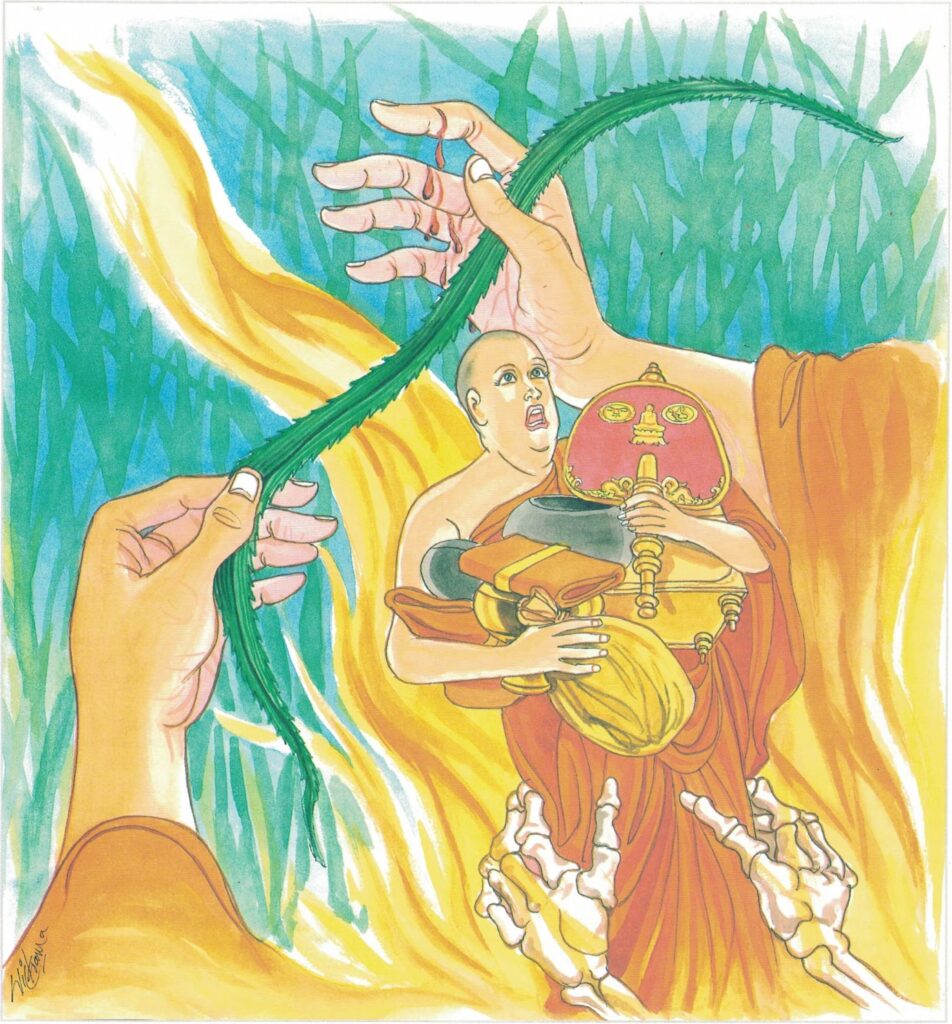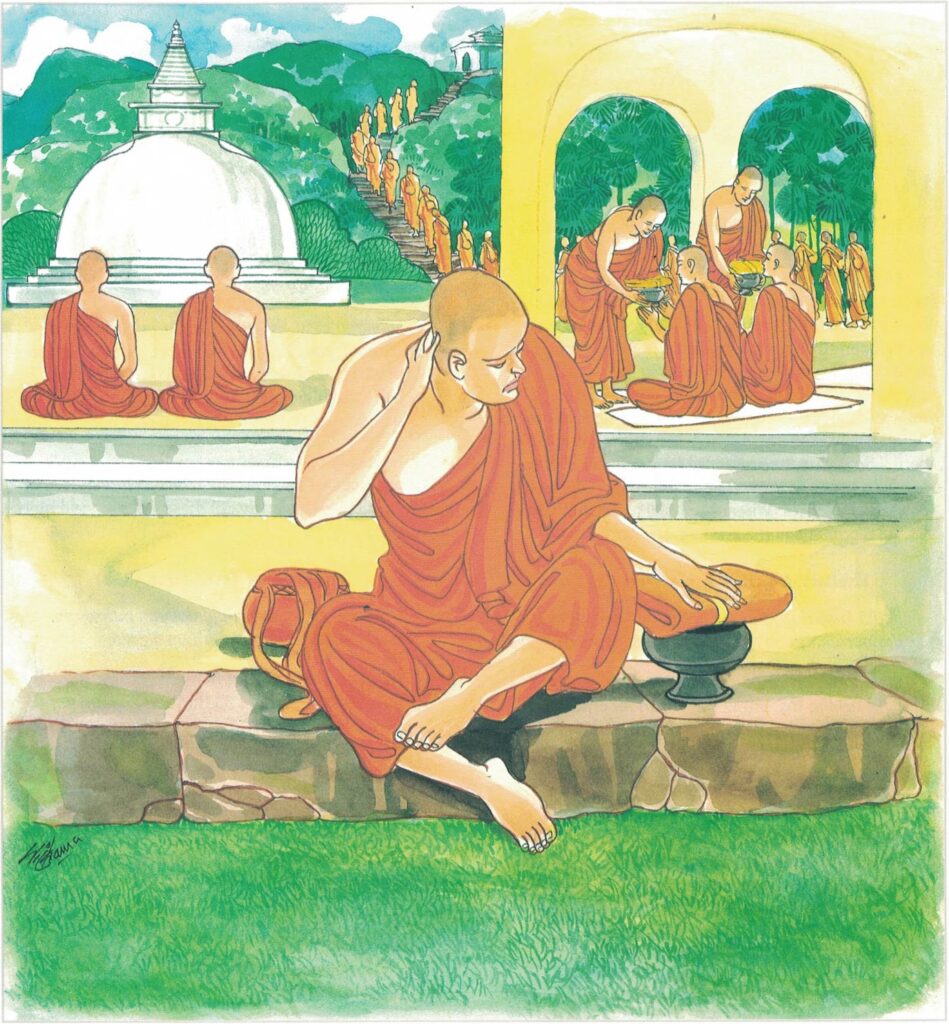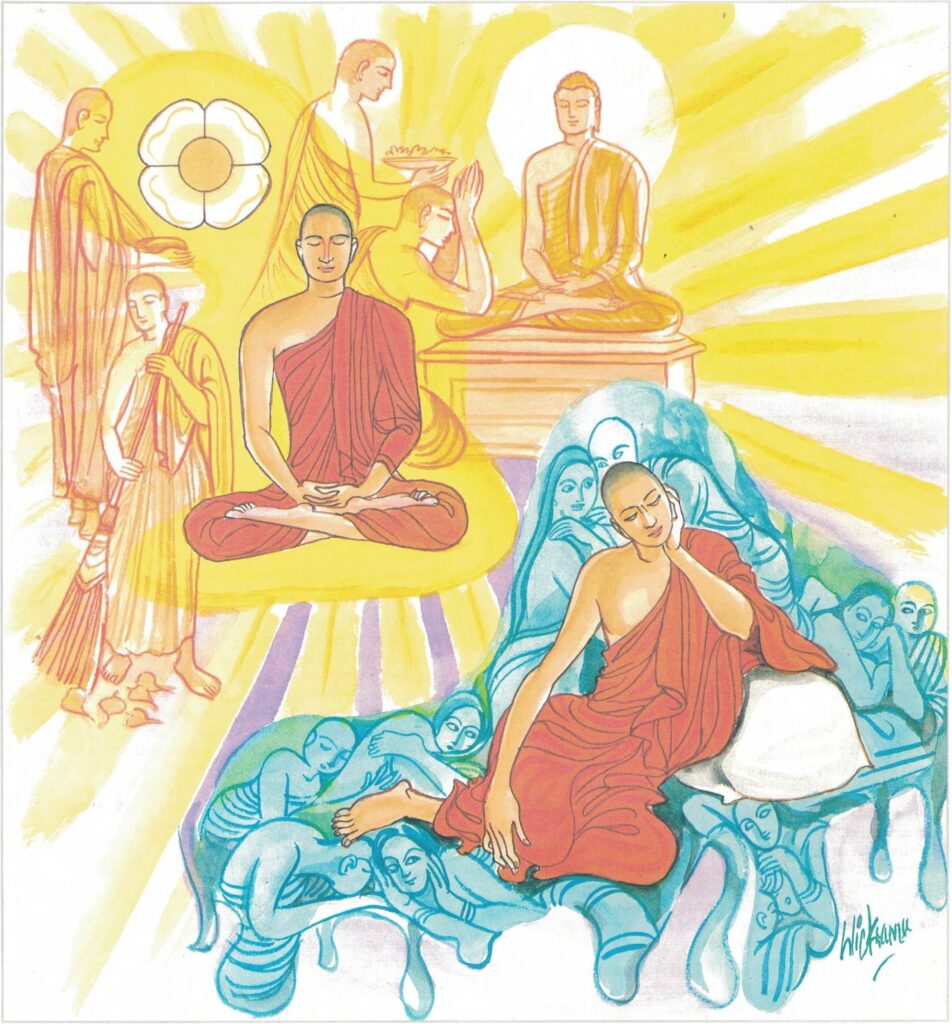Pali text, illustration and English translation of Dhammapada verse 311-313:
kuso yathā duggahito hattham evānukantati |
sāmaññaṃ dupparāmaṭṭhaṃ nirayāyū’pakaḍḍhati || 311 ||
yaṃ kiñci sithilaṃ kammaṃ saṃkiliṭṭhaṃ ca yaṃ vataṃ |
saṅkassaraṃ brahmacariyaṃ na taṃ hoti mahapphalaṃ || 312 ||
kayirā ce kayirāth’enaṃ daḷham etaṃ parakkame |
sithilo hi paribbājo bhiyyo ākirate rajaṃ || 313 ||
311. As blade-grass when wrongly grasped the hand does lacerate so a mishandled monastic life drags one off to hell.
312. Whatever of kammas slack, whatever of vows corrupt, a faltering in the holy life never brings ample fruit.
313. If there’s aught that should be done let it be done then steadily, in truth a slack monastic life all the more stirs up the dust.



The Story of the Obstinate Monk
While residing at the Jetavana Monastery, the Buddha spoke these verses with reference to an obstinate monk.
Once, there was a monk who was feeling remorse for having unwittingly cut some grass. He confided this to another monk. The latter was reckless and stubborn by nature, and he did not think much about committing small misdeeds. So, he replied to the first monk, “Cutting grass is a very minor offence; if you just confide and confess to another monk you are automatically exonerated. There is nothing to worry about.” So saying, he proceeded to uproot some grass with both hands to show that he thought very little of such trivial offenses. When the Buddha was told about this, he reprimanded the reckless, stubborn monk.
Explanatory Translation (Verse 311)
yathā kuso duggahito hattham eva ānukantati
dupparāmaṭṭhaṃ sāmaññaṃ nirayāyū pakaḍḍhati
yathā: just as; kuso: a blade of kusa grass; duggahito [duggahita]: held in the wrong way; hattham eva: the hand itself will; ānukantati: get cut; dupparāmaṭṭhaṃ [dupparāmaṭṭha]: wrongly practised; sāmaññaṃ [sāmañña]: monastic life; nirayāyū: to hell; pakaḍḍhati: will drag down
The blade of the kusa grass, if held wrongly, will cut one’s hand. In the same way, if one were to handle monastic life in the wrong way–against the grain–it will pull the person down into hell.
Explanatory Translation (Verse 312)
sithilaṃ yaṃ kiñci kammaṃ saṅkiliṭṭhañ yaṃ vataṃ ca
saṅkassaraṃ brahmacariyaṃ taṃ mahapphalaṃ na hoti
sithilaṃ [sithila]: casually; yaṃ kiñci kammaṃ [kamma]: some act of merit; saṅkiliṭṭhañ: blemished; vataṃ ca: some practice; saṅkassaraṃ ca: dubious; brahma-cariyaṃ [cariya]: higher life; taṃ: all this; mahapphalaṃ na hoti: will not yield high results
Some act of merit may get committed casually. The practice of a religious rite may be tainted. Higher life may get led dubiously. All these will not yield high results.
Explanatory Translation (Verse 313)
ce kayirā etaṃ kayirātha daḷham parakkame
hi sithilo paribbājo bhiyyo rājaṃ ākirate
ce: if; kayirā: some act of merit is being performed; kayirā etaṃ: do that act; daḷham parakkame: with concern and commitment; hi: if for some reason; sithilo [sithila]: casual; paribbājo [paribbāja]: asceticism; bhiyyo [bhiyya]: will profusely; rājaṃ ākirate: will sprinkle
If you have to do an act of merit, do it with a sense of commitment and concern. But if the practice of monastic life is casual, instead of reducing the dust, much dust will be smeared.
Commentary and exegetical material (Verse 311-313)
These verses are an observation of the nature of right and wrong action. The Buddhist theory of action is embodied primarily in the Buddha’s teachings on kamma.
Kamma is an impersonal, natural law that operates in accordance with our actions. It is a law in itself and does not have any lawgiver. Kamma operates in its own field without the intervention of an external, independent, ruling agent.
Kamma can be explained in many different ‘languages.’
Kamma can be put in the simple language of the child: Do good and good will come to you, now and in the future. Do bad and bad will come to you, now and in the future.
In the language of the harvest, kamma can be explained in this way: If you sow good seeds, you will reap a good harvest. If you sow bad seeds, you will reap a bad harvest.
In the language of science, kamma is called the law of cause and effect. Another name for this is the law of moral causation. Moral causation works in the moral realm just as the law of action and reaction works in the physical realm.
In the Dhammapada, kamma is explained in this manner: The mind is the chief (forerunner) of all good states. If you speak or act with a good mind, then happiness follows you just as the wheel follows the hoof of the ox.
Kamma is simply action. Within animate organisms there is a power or force which is given different names such as instinctive tendencies, consciousness, etc. This innate propensity forces every conscious being to move. He moves mentally or physically, His motion is action. The repetition of actions is habit and habit becomes his character. In Buddhism, this process is called kamma.
In its ultimate sense, kamma means both good and bad, mental action or volition. “Kamma is volition,” says the Buddha. Thus kamma is not an entity but a process, action, energy, force. Some interpret this force as ‘action-influence’. It is our own doings reacting on ourselves The pain and happiness man experiences are the results of his own deeds, words, and thoughts reacting on themselves. Our deeds, words and thoughts produce our prosperity and failure, our happiness and misery.
Kamma is an impersonal, natural law that operates strictly in accordance with our actions. It is a law in itself and does not have any lawgiver. Kamma operates in its own field without the intervention of an external, independent ruling agency. Since there is no hidden agent directing or administrating rewards and punishments, Buddhists do not rely on prayer to influence any supernatural forces. According to the Buddha, kamma is neither predestination nor some sort of determinism imposed on us by some mysterious unknown powers or forces to which we must helplessly submit ourselves.
Buddhists believe that man reaps what he has sown; we are the result of what we were, and we will be the result of what we are. In other words, man is not absolutely what he was and he will not absolutely be what he is. This simply means that kamma is not complete determinism: The Buddha pointed out that if everything is determined, then there could be no free will and moral or spiritual life could not be possible. We would merely be the slaves of our past. On the other hand, if everything is undetermined, then there can be no cultivation of moral and spiritual growth. Therefore the Buddha accepted neither strict determinism nor strict indeterminism.
These misinterpretations or irrational views on kamma are stated in the Anguttara Nikāya which suggests that the wise will investigate and abandon the following: (1) there are some who believe that everything is a result of acts in previous lives; (2) there are others who believe that all is the result of creation by a Supreme Ruler; (3) there are others again who believe that everything arises without reason or cause. Then if a person becomes a murderer, a thief, an adulterer, etc., if his actions are due to past actions, or made by the creation of a supreme ruler, or if they happen by mere chance, then this person would not be responsible for his evil action.
Yet another misconception of kamma is that it operates only for certain people or for people in certain faiths. But the fate of a man in his next life does not in the least depend on what brand of religion he chooses. Whatever be his religion man’s fate depends entirely on his deeds by body, speech and thoughts. It does not matter what religious label he gives himself, he is sure to be in a happy world in his next life so long as he does good deeds and lives a cultured life without harming others. He is sure to be born to lead a wretched life if he commits evil and harbours wicked thoughts in his mind. Therefore, Buddhists do not preach that they are the only blessed people who can go to heaven after their death. Whatever his faith, man alone determines his own position both in this life and in the next. The teaching of kamma does not indicate a postmortem justice. The Buddha, who had no ulterior, selfish motive, did not teach this law of kamma to protect the rich and to comfort the poor by promising illusory happiness in an after life.
Buddhists believe that kamma explains the inequalities that exist among mankind. These inequalities are due not only to hereditary factors, environment, and nature, but also to kamma or the results of our own actions.
Since kamma is an invisible force, we cannot see it working with our physical eyes. To understand how kamma works, we can compare it to seeds: The results of kamma are stored in the subconscious mind in the same way as the leaves, flowers, fruits and trunk of a tree are stored in its seed. Under favourable conditions, the fruits of kamma will be produced just as with moisture and light, the leaves and trunk of a tree will sprout from its tiny seed.
The working of kamma can also be compared to a bank account: A person who is virtuous, charitable and benevolent in his present life is like a person who is adding to his good kamma. But he must replace what he takes or else one day his account will be exhausted and he will be bankrupt. Then whom will he be able to blame for his miserable state?
He can blame neither others nor fate. He alone is responsible. Thus a good Buddhist cannot be an escapist. He has to face life as it is and not run away from it. The kammic force cannot be controlled by inactivity. Vigorous activity for good is indispensable for ones own happiness. Escapism is the resort of the weak; but an escapist cannot escape the effects of the kammic law.
To understand the law of kamma is to realise that we ourselves are responsible for our own happiness and our own misery. We are the architects of our kamma. Buddhists believe that man has every possibility to mould his own kamma and thereby influence the direction of his life. Man is not a complete prisoner of his own actions; he is not a slave of his kamma. Nor is man a mere machine that automatically releases instinctual forces that enslave him. Nor is man a mere product of nature. Man has within himself the strength and the ability to control his kamma. He is mightier than his kamma and so the law of kamma can be made to serve man. Man does not have to give up his hope, effort, and intelligence in order to surrender himself to his kammic force. To offset the reaction of the bad kamma that he has done previously, a man has to do meritorious deeds and to purify his mind rather than by praying, worshipping, or performing religious rites.
Man must use the material with which he is endowed to promote his ideal. The cards in the game of life are given to us. We do not select them. They are traced to our past kamma; but we can call as we please, lead what suit we will and, as we play, we can gain and lose.
The radical transformations in the characters of Angulimāla and Asoka illustrate man’s potential to gain control over himself.
Angulimāla was a highway robber who caused the deaths of many men. Can we judge him by his external actions? For within his lifetime, he became an arahat and thus erased all his past misdeeds.
Asoka, the Indian emperor, killed thousands and thousands to fight his war and to expand his empire. Yet after winning the battle, he completely reformed himself and changed his career to such an extent that today, ‘Amidst the tens of thousands of names of monarchs that crowd the columns of history, their majesties and royal highnesses and the like, the name of Asoka shines and shines almost alone, as a star.’
Although Buddhists believe that man can eventually control his kammic force, they do not believe that everything is due to kamma. They do not ignore the role played by other forces of nature.
According to Buddhism, there are five orders or processes or natural laws (niyamas) which operate in the physical and mental worlds:
- the physical laws (utu niyāma) relating to seasonal changes etc.,
- the biological laws (bīja niyāma) related to order of germs and seeds,
- the kammic law (kamma niyāma) relating to moral causation or the order of act and result,
- spiritual phenomena (Dhamma niyāma) relating to electric forces, movement of tides, etc., and
- psychological laws (citta niyāma) which govern the processes of consciousness.
Kamma is considered only as one of the five natural laws that account for the diversity in this world.
Kamma is often influenced by external circumstances: Beneficent and maleficent forces act to counter and to support this self-operating law. These other forces that either aid or hinder kamma are: Birth, time or conditions, beauty, and effort.
A favourable birth (gati sampatti) or an unfavourable birth (vipatti) can develop or hinder the fruition of kamma. For instance, if a person is born to a noble family or in a state of happiness, his fortunate birth will provide an easy opportunity for his good kamma to operate. An unintelligent person who, by some good kamma, is born in a royal family will, on account of his noble parentage, be honoured by the people. If the same person were to have a less fortunate birth, he would not be similarly treated.
Beauty (upadi sampatti) and ugliness (upadi vipatti) are two other factors that hinder or favour the working of kamma. If by some good kamma, a person obtains a good birth, but is born deformed by some bad kamma, then he will not be able to fully enjoy the beneficial results of his good kamma. Even a legitimate heir to a throne may not perhaps be raised to that high position if he happens to be physically or mentally deformed. Beauty, on the other hand, will be an asset to the possessor. A good looking son of poor parents may attract the attention of others and may be able to distinguish himself through their influence. Also, we can find cases of people from poor, obscure family backgrounds who rise into fame and popularity as film actors or actresses or beauty queens.
Time and occasion are other factors that influence the working of kamma. In the time of famine or during the time of war, all people without exception are forced to suffer the same fate. Here the unfavourable conditions open up possibilities for evil kamma to operate. The favourable conditions, on the other hand, will prevent the operation of bad kamma.
Effort is perhaps the most important of all the factors that effect the working of kamma. Without effort, both worldly and spiritual progress is impossible. If a person makes no effort to cure himself of a disease or to save himself from his difficulties or to strive with diligence for his progress, then his evil kamma will find a suitable opportunity to produce its due effects. However, if he endeavours to surmount his difficulties, his good kamma will come to help him. When shipwrecked in the deep sea, the Bodhisatta Mahā Janaka made an effort to save himself, while the others prayed to the gods and left their fate in the hands of these gods. The result was that the Bodhisatta escaped while the others were drowned.